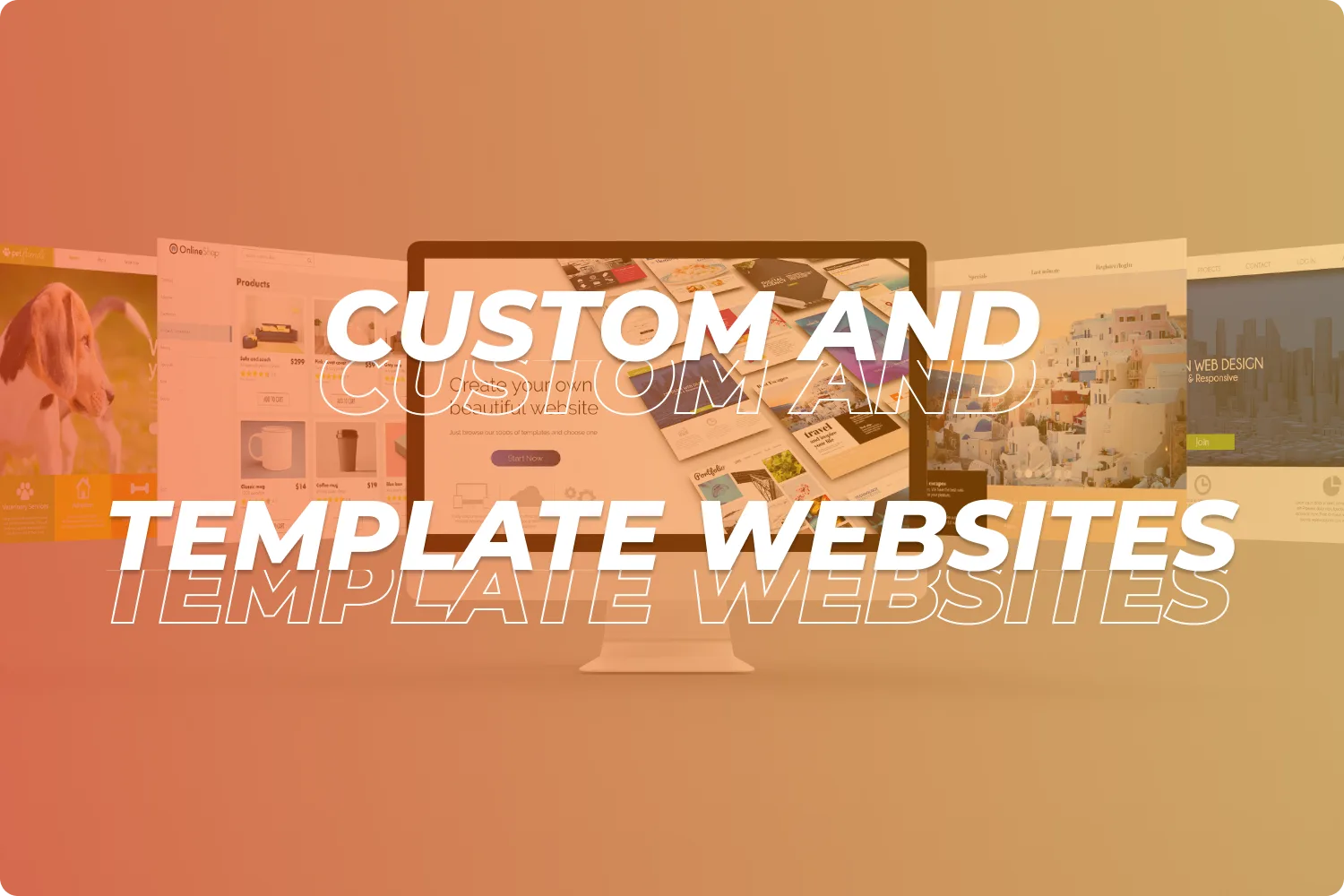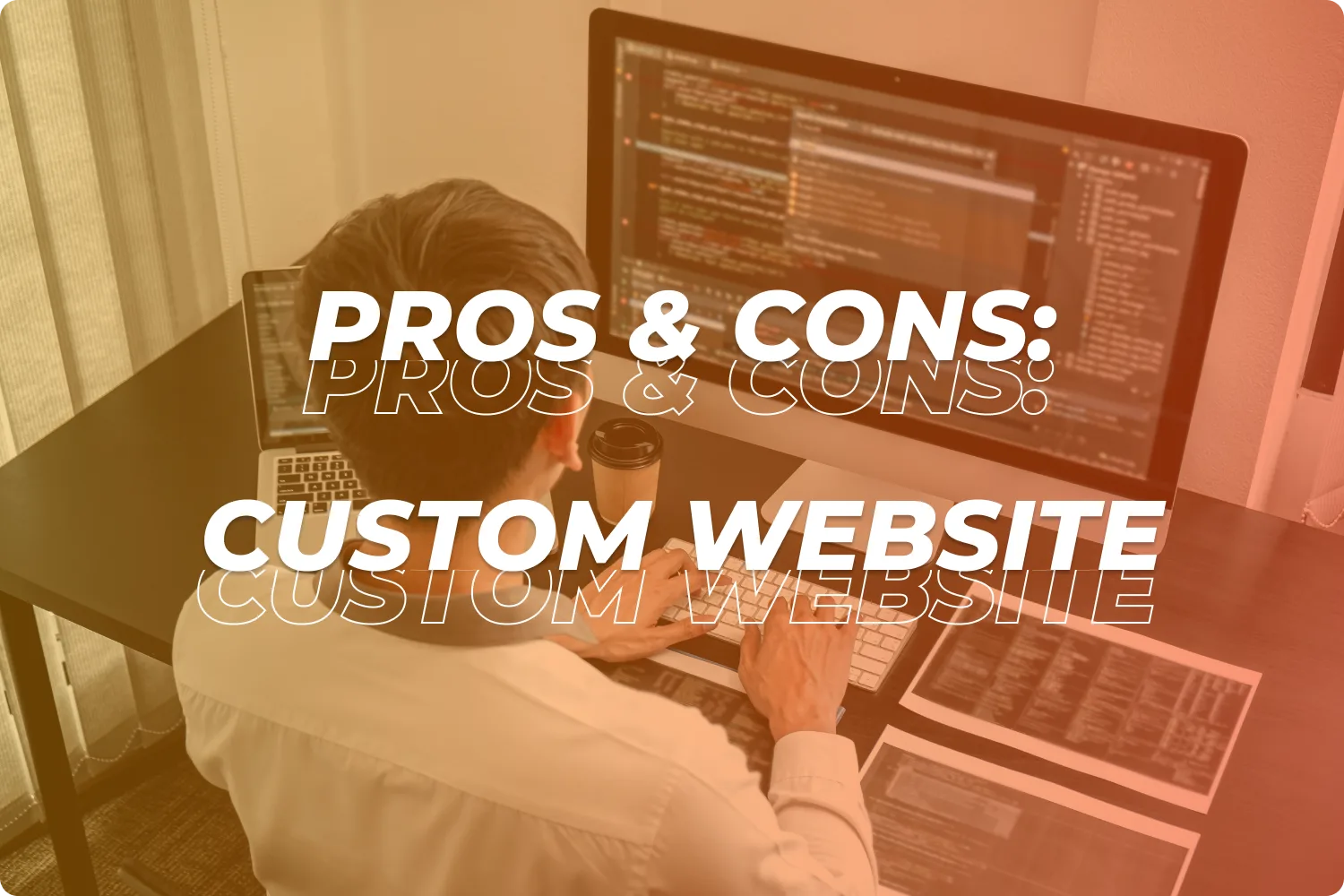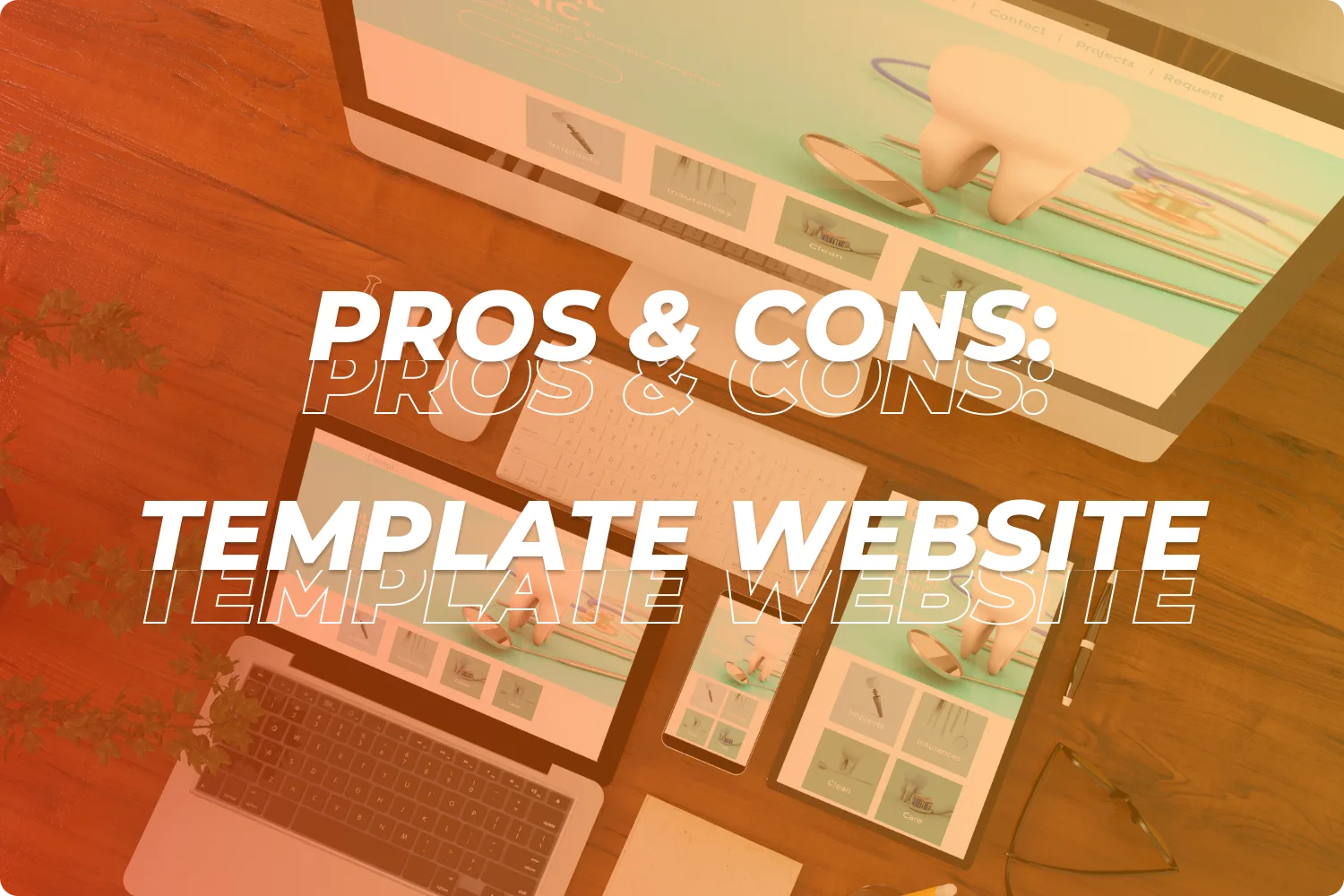Custom vs. Template Websites: Which One Is Right for Your Business?
Did you know that over 10,000 websites are created every hour? Developing a finesse and appealing website for your business that stands out can be a challenge because of this. Especially now that you want your website to rank better on Google as the competition in the digital market has increased a lot. No matter what the size and scope of your business, it is imperative to have a digital presence that is both unique and functional. If you are starting a new business, running a small one, or planning to expand an existing one, your digital profile is critical to ensure that you draw clients and establish a reputation.
Business owners often find themselves in trouble when it comes to choosing between a customized website or template website. This is because each has their own advantages and disadvantages. Let’s get into the details of the pros and cons of a custom website and a template website to help you understand which one is suitable for your business.
What is a Custom Website
A custom website is the one that is created from the beginning by the developers as per the needs and demands of the business. It takes time and requires specialized developers. Creating a custom website is extremely beneficial for businesses who want to add a personal touch to their online profile and remain innovative in the market.
What is a Template Website
Template websites are pre-designed layouts that can be used with website builders such as Wix, Squarespace, Shopify, or even WordPress themes. They are easy-to-use and mostly involve just “drag and drop” elements to create a website.
Pros of a Custom Website
There are many benefits of going for a custom website for your business. Some of these are:
1. Flexibility in terms of Designing
A custom website’s huge benefit is that it provides flexibility. This is because when you start to develop and design a website from scratch, you can implement your ideas and novelty beyond the limitations of a plugin tool. In this, you can create your digital presence from the start, so everything can be customized as per your brand’s identity, beliefs, and personality.
By providing a wide array of options in brand’s colors, font, interactive animations, and a unique layout structure, a custom-built website ensures that your site has a personal touch.
For instance, a boutique fashion firm may want a homepage with a cinematic video of a model, fluid scroll animations, and editorial-style product pages to provide a high-end, immersive experience. A template just would not provide that amount of flair.
2. Tailor as per your Needs
Templates are frequently designed for common use cases, but what if your organization wants special features?
With a bespoke build, you are not confined to pre-made tools. Developers can create exactly what you need, whether that’s a complicated appointment scheduling system, multilingual product configurator, a secure client dashboard or even a custom quote tool for specialized services.
This personalized functionality improves your workflow and user experience, resulting in a site that truly works for your business.
3. Scalable
A custom website allows you to integrate the addition and modification of your business ideas, products in your website as the business continues to grow. This guarantees that your website does not “outgrow” your demands. For example, an e-commerce brand may start with a few dozen SKUs, but as they expand internationally and introduce multi-currency payments, advanced filters, or B2B portals — their custom site can scale up seamlessly.
4. Better Performance and SEO
Custom websites are created using clean and efficient coding. There is no extra bloat, which means faster loading time which is an important component in user experience and SEO rankings. While opting for custom website, you have the flexibility to:
- Structure your content in SEO-friendly ways.
- Implement schema markup.
- Optimize your photos and materials.
- Implement sophisticated on-page SEO tactics.
This ultimately gives you an advantage over your competitors who use non-optimized templates.
Cons of Custom Website
Although custom websites offer huge benefits, there are also a lot of disadvantages associated with the custom website for your business. The following are the cons:
1. High Costs
Custom websites are not inexpensive, and with good reason. You’re paying for the experience of web designers, developers, UI/UX professionals, and maybe SEO consultants, all of whom are working on your site from the bottom up.
However, it is frequently regarded as a long-term investment that yields benefits in brand value, performance, and adaptability.
2. Time Taking
Unlike template websites, which can be created in a very short span of time, custom websites usually go through the entire life cycle including planning, design, development, testing, and refinement. This can take up to 4 to 12 weeks or more, depending on the scale. You will go through several phases:
- Wireframing and Strategy
- Design iterations
- Development and Testing
- Content integration
- Revisions
Businesses who need to go online as soon as possible, such as those preparing for a product launch or an event, usually don’t go for this option.
3. Requires Maintenance
One of the most significant drawbacks of a custom website is that it frequently requires maintenance in terms of technicalities. For instance, if the website has been attacked or defaced. Or if your business has launched a new product and you need to add it to the website, then you will have to hire a developer to update the website.
In any sort of maintenance or upgradation, most probably you’ll need to hire an expert to handle it, which will need recurring fees or retainer agreements.
Pros of a Template Website
Template websites offer huge benefits to companies as well. Let’s look at the benefits of a template website:
1. Budget Friendly
One biggest benefit of opting a template website is that it is budget friendly. There are many platforms that offer beautiful free themes, while premium designs typically cost between $20 and $100. This amount is nothing compared to the cost of a personalized website. Some website builders like WordPress also provide hosting, domains and other functionalities as a complete package.
2. Quick to Launch
If you want a website right away, then templates are your best friend. The design and structure are already there, all you have to do is add your content, images, logo, and just hit the “Publish” button.
This is a huge benefit if you have a tight deadline or you are holding an event, then just go for a template-based website.
3. User Friendly
You don’t have to be technical to develop a website using templates. Most employ drag-and-drop editors or visual builders, which allow you to rearrange layouts, alter colors, upload content, and add features without having to write a single word of code. So, if you have very good aesthetics, then building a website using a template is a one man show.
Platforms such as Wix, Shopify, and Elementor (for WordPress) allow practically anybody to create a professional-looking website, even if they have no web programming skills.
4. Wide Array of Designs
There is a wide variety of designs for creating blogs, websites or a personal portfolio. Each design is mobile responsive and includes modern elements to make your website look extremely up to date without hiring any professional website designer.
Cons of a Template Website
While template websites offer plenty of convenience and cost savings, they aren’t without their drawbacks. Before you jump in, here are some key limitations to consider:
1. Limited Customization
Templates provide ease, but at the expense of flexibility. Most themes do not allow you to change the layout and stylistic options. While you may alter colors, fonts, and pictures, it may be difficult to rearrange sections, create any creative animations or introduce any novel features.
2. Lack of Innovation
The more popular the template, the more likely it is to be adopted by hundreds of other websites, including potential competitors. This can make your brand identity weak, making it challenging for your business to stand out.
3. Compromise on Speed
Many templates are supposed to be “one size fits all,” which sounds fantastic until you get to know that there are hundreds of features and scripts you won’t ever use. This can lead to code bloating which can affect the speed of your website, lower your website’s SEO ranking and reduce the user experience, particularly on mobiles.
4. SEO Limitations
While many template websites offer built-in SEO capabilities like meta tags, alt text, and sitemaps, they sometimes lack the depth and flexibility that SEO specialists want. Usually there are hurdles in accessing backend code, fixing mobile optimization and inflexibility in URL structures.
Which One Should You Choose?
The best option depends on the scope and requirements of your business. It depends on what impact you want to have on your audience.
If you have peculiar requirements, want special features and a completely branded experience, then you should consider a custom website for your business. A custom website is great for organizations that have the resources and patience to invest in a customized, high-quality solution, such as SaaS products, huge e-commerce platforms, real estate websites, agencies, or corporations. A template website, on the other hand, is ideal if you’re starting off quickly on a small budget, want a minimal online presence, or want to design it yourself without touching code.
In short, the following are the factors that should be kept in mind before deciding whether to choose template or custom website for your business:
- Budget: Custom websites typically start at several thousand dollars, while template-based sites can cost little to nothing.
- Time frame: Templates are ideal for rapid deployment, whereas custom builds require a longer timeline for development and testing.
- Audience: Check what your audience demands. If they are more towards innovation, then go for custom websites.
- Business goals: If you want to scale up and grow your website in the future, then a custom website will be a better option.
- Technical expertise: If you’re not tech-savvy and don’t have access to a developer, using a template with a drag-and-drop editor might be your best bet.
- Branding needs: If branding is crucial to your marketing plan, a customized website allows you to express your identity in a better way.
A Hybrid Approach
If you’re stuck in the middle and unclear which option to choose, then you can always opt for a hybrid approach. You can try choosing a template. Next, you can gradually start personalizing it by changing colors, fonts or even tweaking the sections with the help of an expert developer or designer. This approach helps you to begin fast and economically, while still building a site that fits your brand as you develop. WordPress, Webflow, and Shopify all have premium themes that not only have amazing and appealing designs but also are versatile enough to allow for extensive modification.
With some expert assistance, you may change layouts, improve functionality, and optimize performance, offering you the best of both worlds: speed and cost-efficiency up front.
Conclusion
Choosing the right kind of website development is a crucial step in business as it develops brand identity. There are multiple factors that are included like time, budget, and audience while deciding whether to go for a custom or template design. Many businesses understand the importance of having a unique website, that is why they have an entire department dedicated to it.
The decision between a custom-built website and a template-based website does not decide which one is better, it only tells you which is suitable for your company. If you are trying to elevate the business profile by adding originality, uniqueness, scalability, and want complete control, then you should consider investing in a custom website. On the other hand, if you’re a small, scaled company starting out that have a restricted budget, or need to launch quickly then templates are a more practical and user-friendly starting point.
Whatever road you take, remember that your website is frequently your first impression, so make it count. Your internet presence should evolve alongside your business. Begin where you are and progress when you are ready.
At FunctionEight, our experts have been helping businesses translate their brand personality into their digital identity by creating custom websites as per their requirements. If you need one, get in touch today!






